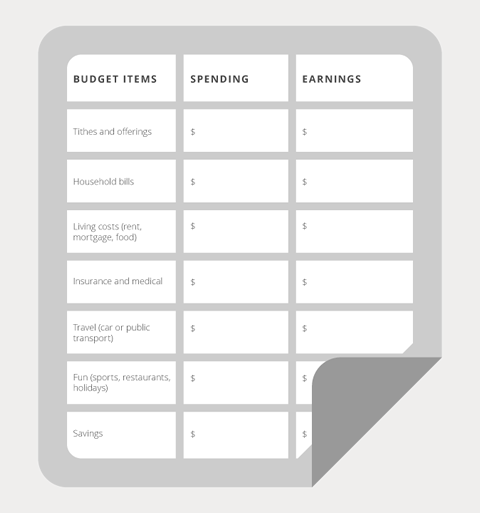
For some of us, our money manages us. It tells us when we have to put in more hours, it tells us we have to pay more interest, and it even tells us what we can eat. Sometimes we feel like we’re running as fast as we can without getting anywhere. Being at the mercy of bills and debt can also add unnecessary stress and tension to relationships.
On the other side of the coin—pardon the pun—people who stick to a regular budget say it gives them peace of mind and makes them feel better about life in general.
You might think that only rich people can afford to stick to a budget and be happy too. Actually, that’s not true. We can all live comfortably within our means. All it takes is a plan and a little self-discipline.
So where to begin? With work of course. Work hard and smart. Prove to your employer that you are valuable and honest. Spend a little extra time learning how to do your job better. Employers love employees who show initiative and make things run more smoothly.
So when do we talk about budgeting?
Not yet. First things first: pay tithes and offerings. If you are going to succeed, you have to make sure God is on your side. He has promised He will bless you for your sacrifice:
“Bring ye all the tithes into the storehouse, that there may be meat in my house; and prove me now herewith, saith the Lord of Hosts, if I will not open you the windows of heaven, and pour you out a blessing that there shall not be room enough to receive it” (3 Nephi 24:10).
Now we can talk about budgeting. Start with a spending diary. Keep close track of everything you spend and everything you earn for a full month. Before you can realistically spend less than you are making, you have to have a clear view of what you are currently spending.
Create seven categories:
- Tithes and offerings
- Household bills
- Living costs (rent, mortgage, food)
- Insurance and medical expenses
- Travel (car or public transport)
- Fun (sports, entertainment, holidays)
- Savings
Take every item in your spending diary and put it in a category. Then put the earnings in another column. It should look something like this:

Then comes the hard part. You have to make sure you are spending less than you are earning. So carefully go through each item on the left and see what you can do without, even though it might be painful. If you are going through this process with your spouse, you might want to say a prayer together to help avoid contention.
Once the budget is set, a simple way to keep track of each category is to put the allotted money in envelopes marked “Household bills,” “Living costs,” and so on. You could also keep a ledger and record when you spend something in each category. Remember, the best place to save money is in the “Fun” category. Look for free things that are fun to do as a family.
Here are some other tips:
- Look for bargains when you shop.
- Decide on items you don’t really need to buy.
- Avoid loans.
There are many ways to save—be prayerful and seek guidance in finding them.
As your savings grow, you will feel a sense of security and peace. You’ll know that you are doing everything you can, including paying a regular tithe. That’s when the Lord blesses us—when we strive to do what He has asked.
“I, the Lord, am bound when ye do what I say; but when ye do not what I say, ye have no promise” (D&C 82:10).

